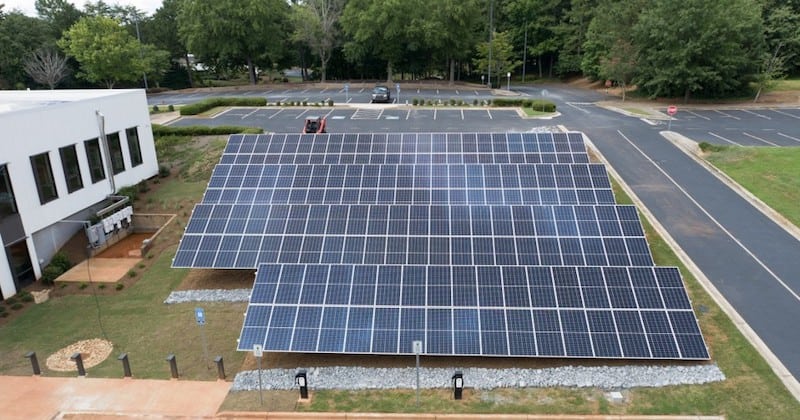ASHRAE’s new global headquarters will operate at net-zero-energy (NZE) performance following the recent installation of a large photovoltaic (PV) system. Buildings classified as NZE consume less energy over the course of a year than is generated onsite through renewable energy resources.
“Completing the installation of our PV system marks a tangible milestone for ASHRAE that will demonstrate to others how to successfully move on the path to NZE status,” said 2021-22 ASHRAE President Mick Schwedler, P.E., Fellow ASHRAE, LEED AP. “This project is special because it’s a testament to ASHRAE’s leadership and commitment to sustainability and showcases innovative built environment technology. We are extremely proud of this important accomplishment.”

In January 2020, ASHRAE began a $20 million renovation project on its new global headquarters building, located in the popular tech-based corridor at 180 Technology Parkway, Peachtree Corners, GA. Built in 1978, the existing 66,770-square-foot building on 11 acres of land became a demonstration project intended to prove the economic viability of a NZE operation.
“An important part of getting to NZE is the low energy consumption of the building (low EUI of 21 kBTU/sf/year) – while maintaining excellent ventilation and IAQ,” said Ginger Scoggins, P.E. Fellow ASHRAE, CEM, CxA, ASHRAE treasurer and former chair of the ASHRAE Headquarters Building Ad Hoc Committee. “The installation of the PV panel system is a great of example of how to reduce grid-energy consumption and greenhouse emissions in an older, existing building to create a sustainable and innovative environment.”
Completed through Creative Solar USA, the 332kW project was a combination of three sub-arrays:
- 187kW ballasted rooftop
- 65kW ground mount on a south facing hill adjacent to the building (allowing narrower spacing between rows and thus higher energy density)
- 81kW ground mount situated in an unused section of the parking lot
“The goal of the project was to pursue a design that minimized the environmental footprint on the site, while trying to optimize the use of the building’s roof and adjacent areas that did not involve land disturbance or removal of established trees,” said Chris McMahan, commercial project manager.
The total system size had to be constrained within the maximum cap set by the local electric utility provider for customers wishing to interconnect through the monthly netting program.

PV systems such as the ASHRAE’s offer approximately 25 years of performance. The addition of power optimizers, which are small devices that sit behind the panels and are paired to the SolarEdge inverters, mitigate the effect of partial shading, increase safety, and allow ASHRAE to monitor performance down to each individual solar panel.
“When you consider the total system cost and the very little maintenance associated with it, the levelized cost of energy ends up being around four times lower than the retail rate from the utility,” said Cesar Prieto, business development director, Creative Solar USA. “This type of investment is not only good for the environment, but the permanent reduction in the electricity bill is also very good for the bottom line.”



















![[VIDEO] Collect Asset Data at the Speed of Walking a Building](https://facilityexecutive.com/wp-content/uploads/2024/02/maxresdefault-324x160.jpg)